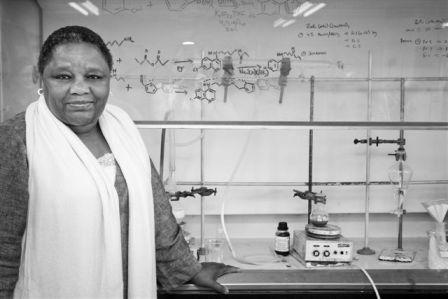
Prof Nyokong, DST/NRF* Professor of Medicinal Chemistry and Nanotechnology at Rhodes and a 2009 'L’Oréal-UNESCO Awards for Women in Science' Laureate, has been invited by Ms Irina Bokova, the UNESCO (United Nations Educational, Scientific and Cultural Organization) Director-General, to sit on the newly announced UNESCO High Panel on Science, Technology and Innovation for Development.
This is, as described by the University’s Deputy Vice-Chancellor for Research and Development Dr Peter Clayton, “a huge accolade for Professor Nyokong” and therefore, by association, for Rhodes University.
The establishment of the High Panel was announced by Ms Bokova at the International Women Leaders Conference on Science, Technology and Innovation: Education and Training for Women and Girls in Haifa on the 29 May 2011.
Composed of eminent scholars, decision makers and intellectuals from all regions of the world, the Panel will meet twice yearly with, says Ms Bokova, “the aim of charting new avenues for more effectively targeting the efforts of our scientific communities in addressing common challenges facing humanity in the 21st century... Our broader goals are to utilise science for poverty reduction, for sustainable development and for building a culture of peace.”
The Panel is one of a number of initiatives associated with the UNESCO Global Partnership on Girls’ and Women’s Education, launched earlier this year by Ms Bokova with United Nations Secretary-General Ban-Ki Moon and the United States Secretary of State Hillary Clinton.
UNESCO is joining forces with major private sector companies such as GEMS Education, Nokia, Procter and Gamble, Microsoft and the Packard Foundation, with the intention of harnessing the power of technology and innovation to support womens' literacy and education. The focus falls especially on the Least Developed Countries, who will be supported in creating national frameworks for Science, Technology and Innovation policies.
In addition UNESCO is supporting the African Union and NEPAD in taking forward Africa’s Science and Technology Consolidated Plan of Action and, in November, it is organising a major conference on Science, Technology and Innovation for Africa’s Development in partnership with the African Union and the African Development Bank. Ms Bokova, in her address to the Haifa conference, described promoting gender equality as being "the red thread weaving these actions together."
“I am very honoured. To be shaping global policy is, you know, a huge thing,” Professor Nyokong says, adding that she, as a researcher, is particularly interested in the innovation aspect of the panel, especially as it applies to Africa. I believe in Africa we have many innovators, who we need to find a way of helping (in order) to bring their innovations to the fore. Otherwise we remain only as consumers, while the West innovates.”
Prof Nyokong is passionate about empowerment, and about education: “making the brain work, as a way of alleviating poverty.” One of her areas of interest is on the education of girls and women from third world countries. As an African, she feels that she has an insight into their situation, and the challenges facing them. The concept of mentorship is something which she is enthusiastic about, as is the challenge of encouraging more girls to continue on in the physical sciences. Her vision encompasses the one-on-one mentor system, which she describes as being “support for one person, who will then uplift another, woman to woman.”
The first meeting of the Panel is scheduled to occur in September this year, and will explore the nexus between the sciences and development, and the connection between research and policy-making.
*DST = Department of Science and Technology, NRF= National Research Foundation
